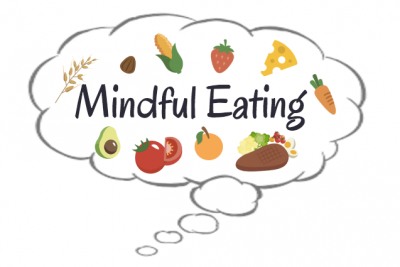
By Shelley Balls
UW Extension, Nutrition and Food Safety Educator

It’s no secret that a common New Year’s resolution is weight loss. Healthy weight loss requires sustainable lifestyle changes to make it happen. You may have heard of the common healthy lifestyle habits for weight loss and overall health, which are regular physical activity and eating a well-balanced diet.
So, is there something else that you could be missing that’s preventing you from reaching your goals each year? It could be that you’re eating the right foods and working out, but you’re not eating mindfully. Mindful eating adopted as a regular practice may help you lose that excess weight and keep it off.
• Beyond Chewing Your Food More
Mindful eating is more than just chewing your food more before you swallow. Mindful eating encourages you to appreciate food rather than restrict it, by having a beginner’s mind and patiently appreciating each moment with full awareness. It encourages you to trust in your own decisions rather than being restricted by rules about what and when to eat.
Mindfulness encourages you to live fully in each moment and appreciate life as it is. When was that last time you ate a meal that you were truly satisfied with? Today more than ever we have so many distractions that make it hard to eat mindfully, such as electronic devices, TVs, busy schedules, etc. that often we’re not fully aware of what, or how much we’re eating. If you’ve ever watched a movie with popcorn or chips in front of you, you’ve probably noticed that you don’t realize how much you’ve eaten until it’s gone, let alone appreciated it! This lack of awareness could be contributing to your lack of weight loss or contributing to weight gain.
• Tips to Eating Mindfully
– Stock Up and Make Healthy Foods Accessible
An important first step to mindful eating is stocking up on nutrient dense foods your body needs to receive the nourishment it requires to thrive. If you load up our grocery cart with calorie dense foods like chips, sugar sweetened beverages and sweets you aren’t going to feel good mentally or physically afterwards. But if you fill your cart and stomach up with whole grains, fruits, vegetables, low-fat dairy, and lean protein you will feel good about yourself and your body will thank you, as you will have the nutrients to replenish cells and fuel itself.
– Embrace All of the Senses
One of my favorite parts of practicing mindful eating is you get to enjoy your food more by bringing all your senses to the meal. This can start with the preparation to cooking, serving, and eating your food. Be mindful to color, texture, aroma, and even the sounds different foods make as you prepare them. As you chew your food, try identifying all the ingredients, especially seasonings. Take time to appreciate the flavors and the food itself.
-Take Time to Evaluate Satiety
Eating slowly and taking time to evaluate your satiety can also help you eat mindfully. By eating too quickly, you may not give our intricate hormonal crosstalk system enough time to work letting your brain know you’re full. It’s likely that we’ve all overeaten at one time or another and it seems like our bodies should have told us to stop before it got to that point, right? Well, it can take approximately 20 minutes for the crosstalk system to work from your digestive system to your brain, and if you eat too quickly, you probably have overeaten and are cleaning up our meal before that signal gets there.
– Start Small
Start off your meal with a smaller portion, and if you’re still hungry after you’ve given it some time, go back for another serving if needed. Sometimes we get the ‘clean your plate’ mentality, but in reality you could put your leftovers back in the fridge to enjoy later or get a to-go container if you’re eating out.
– Eat When You Feel Hungry
We live by the clock, always hurrying to the next thing on your schedule, but don’t let the clock tell you when you should and shouldn’t eat. If you’re hungry at 10:30 am grab a small snack to hold you over until your next meal. Don’t starve yourself, as we tend to overeat when we’re ravenous.
And remember, the scale isn’t going to reflect major change overnight, so don’t get frustrated if it takes time for your healthy lifestyle changes to make a difference, and that could be inches off your waist, more energy, etc. that are not reflected on a scale alone.






